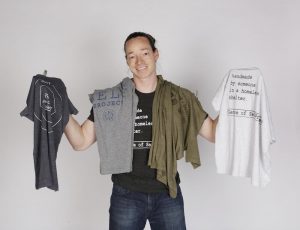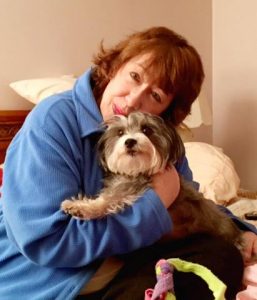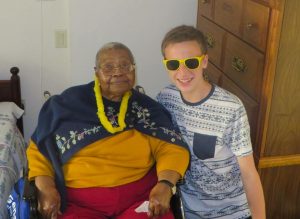America may be going through some hard times, but there are people rising to the occasion to help. A wise man told us to look for the helpers, and these people are definitely the helpers. They make us feel as patriotic as we can right now, and because we are so proud of people like them, we are proud to Americans. These do-dooders, nonprofit founders, and social good entrepreneurs have stolen our hearts and given us hope.
 Aaron Seaney, founder of the Sense of Self Project, was fueled by the belief that no Veteran should be living in a homeless shelter without a job or means of getting the health and mental health care they need. Seaney created a subscription-based T-Shirt business in order to employ them and keep consistent work orders coming in. Six months ago, he personally recruited former U.S. service members outside of a homeless shelter to help him launch the initiative using donated shop space in Williamsburg, Brooklyn. The goal is to reach more Americans that want to support Vets with jobs and be able to hire as many people as they are willing to work. “We want to be a place that offers these Vets work because they are ready and willing but also offer the flexibility to go to doctor’s appointments, career training, interviews and apartment searching because all of that is the end goal. To be healthy, both physically and mentally, and be a self-sustaining member of society,” he says. “I hope to remind these Veterans that they are not forgotten, and they do matter. I see what what others may not, and am willing to put in the time and effort to help make them ‘new’ again.”
Aaron Seaney, founder of the Sense of Self Project, was fueled by the belief that no Veteran should be living in a homeless shelter without a job or means of getting the health and mental health care they need. Seaney created a subscription-based T-Shirt business in order to employ them and keep consistent work orders coming in. Six months ago, he personally recruited former U.S. service members outside of a homeless shelter to help him launch the initiative using donated shop space in Williamsburg, Brooklyn. The goal is to reach more Americans that want to support Vets with jobs and be able to hire as many people as they are willing to work. “We want to be a place that offers these Vets work because they are ready and willing but also offer the flexibility to go to doctor’s appointments, career training, interviews and apartment searching because all of that is the end goal. To be healthy, both physically and mentally, and be a self-sustaining member of society,” he says. “I hope to remind these Veterans that they are not forgotten, and they do matter. I see what what others may not, and am willing to put in the time and effort to help make them ‘new’ again.”
Lynette Whiteman, a caregiver for her mother with Alzheimers who started a dog  therapy and human visitation program for other homebound elderly people with Alzheimers and dementia in her community, which is so impactful that other states have been contacting her about how to duplicate them! They also bring children into their homes (supervised of course) for a music therapy program. She is unbelievable and extremely kind and gracious. She lives in New Jersey. Lynette has spent her professional and personal life dedicated to advocating for, and improving the lives of, people living with Dementia, Alzheimer’s, or who are homebound for other reasons. She also supports and brings joy to the caregivers of those people. Her biggest motivation is to ensure that the voices of the elderly, who are often not heard, are never forgotten—and beyond their voices, it is their very livelihood that matters to her most. As a result, her nonprofit, Caregiver Volunteers, has grown and flourished to include a volunteer force of more than 1,200 individuals, 70 interfaith coalition members and free vital support in over 40 municipalities in Central New Jersey.
therapy and human visitation program for other homebound elderly people with Alzheimers and dementia in her community, which is so impactful that other states have been contacting her about how to duplicate them! They also bring children into their homes (supervised of course) for a music therapy program. She is unbelievable and extremely kind and gracious. She lives in New Jersey. Lynette has spent her professional and personal life dedicated to advocating for, and improving the lives of, people living with Dementia, Alzheimer’s, or who are homebound for other reasons. She also supports and brings joy to the caregivers of those people. Her biggest motivation is to ensure that the voices of the elderly, who are often not heard, are never forgotten—and beyond their voices, it is their very livelihood that matters to her most. As a result, her nonprofit, Caregiver Volunteers, has grown and flourished to include a volunteer force of more than 1,200 individuals, 70 interfaith coalition members and free vital support in over 40 municipalities in Central New Jersey.
Jacob Cramer, now 17, started Letters of Love in 2013 when he was just 13 years old by writing simple letters of heartfelt kindness to residents at my local nursing home, hoping to brighten their day and make them feel loved. He’d been volunteering there already when he took a look around and noticed how elderly residents weren’t really getting visitors, many of them sitting in their rooms, isolated. He started writing letters to people at his local nursing home, then reached out to others. Now, it’s part of a formal nonprofit called Love for the Elderly, and it’s a nationwide program that people of all ages, anywhere, can get involved with, and it’s incredibly simple—for the most part. Cramer decided to write to the folks at Ted Talk and now has not one but two of them under his belt, and after that, people started reaching out to him to find out how they could help. Now, there’s another addition to the program, Sunshine Box, which guides people on how to fill up a box with fun little things like oversized glasses and leis and bring it into a nursing home near them. There’s also a Senior Buddies pen pal program, which was born in February of 2016 as a pilot program after Jacob received a request from a teacher in Brazil. One small action started a movement that has spread like wildfire, one that needs growing attention. By Jacob’s estimate, it’s not an intentional snub, the way that we “don’t think” about people in nursing homes—it’s just not something we hear much about, or read much about, which is a shame, since other cultures, he says, seem to have so much regard for their aging populations.
them sitting in their rooms, isolated. He started writing letters to people at his local nursing home, then reached out to others. Now, it’s part of a formal nonprofit called Love for the Elderly, and it’s a nationwide program that people of all ages, anywhere, can get involved with, and it’s incredibly simple—for the most part. Cramer decided to write to the folks at Ted Talk and now has not one but two of them under his belt, and after that, people started reaching out to him to find out how they could help. Now, there’s another addition to the program, Sunshine Box, which guides people on how to fill up a box with fun little things like oversized glasses and leis and bring it into a nursing home near them. There’s also a Senior Buddies pen pal program, which was born in February of 2016 as a pilot program after Jacob received a request from a teacher in Brazil. One small action started a movement that has spread like wildfire, one that needs growing attention. By Jacob’s estimate, it’s not an intentional snub, the way that we “don’t think” about people in nursing homes—it’s just not something we hear much about, or read much about, which is a shame, since other cultures, he says, seem to have so much regard for their aging populations.
Genevieve Piturro, a former television executive, founded the program after spending  weeks volunteering at a homeless shelter reading to children and feeling like she needed to do something bigger. When she finished reading to the kids, they would go to sleep with their clothes on, which were often dirty, sometimes covered in blood from when the police brought them in. “They were alone and frightened, and given nothing but food,” she recalls. “As I turned to leave one night, a little girl in a Chicago shelter whispered in my ear, ‘Please, don’t forget me.’ People come in and out of their lives, and they’re forgotten.” As she thought about how on earth to find a way to directly help alleviate the number of children in homeless and emergency shelters, group homes, and the foster care system, she realized it was not a problem that she or an entire army of people could tackle—but it might be possible to make life a little more comfortable for them. So, she quit her job and founded The Pajama Program, a nonprofit that brings new books and new pajamas to children in need across the U.S.
weeks volunteering at a homeless shelter reading to children and feeling like she needed to do something bigger. When she finished reading to the kids, they would go to sleep with their clothes on, which were often dirty, sometimes covered in blood from when the police brought them in. “They were alone and frightened, and given nothing but food,” she recalls. “As I turned to leave one night, a little girl in a Chicago shelter whispered in my ear, ‘Please, don’t forget me.’ People come in and out of their lives, and they’re forgotten.” As she thought about how on earth to find a way to directly help alleviate the number of children in homeless and emergency shelters, group homes, and the foster care system, she realized it was not a problem that she or an entire army of people could tackle—but it might be possible to make life a little more comfortable for them. So, she quit her job and founded The Pajama Program, a nonprofit that brings new books and new pajamas to children in need across the U.S.
Dr. Kristen Ali Eglinton started the Footage Foundation in order to help women share  their experiences surviving violence, of “not belonging” and other issues while protecting their respective identities. The nonprofit creates initiatives to help female survivors tell their stories through customized digital storytelling technology, gives them the means to anonymously, and powerfully, speak up in hopes of creating meaningful change. “We know that thousands of young women hear these stories learn they are not alone in their experiences,” said Dr. Eglinton. “Knowing a woman’s story is being used to help young women locally and globally, these storytellers become leaders, and forces of change in the world.” Joined by four other female women PhDs from Cambridge University, Dr. Eglinton and the Foundation bring the program to young female refugees here and overseas and women in the United States living in forced displacement and migration. Their program Her{connect}Her aims to build connections globally among women who feel displaced after having to flee their homes, reaching asylum seekers, economic migrants, refugees, and more living in the UK, France, Sweden, and Greece.
their experiences surviving violence, of “not belonging” and other issues while protecting their respective identities. The nonprofit creates initiatives to help female survivors tell their stories through customized digital storytelling technology, gives them the means to anonymously, and powerfully, speak up in hopes of creating meaningful change. “We know that thousands of young women hear these stories learn they are not alone in their experiences,” said Dr. Eglinton. “Knowing a woman’s story is being used to help young women locally and globally, these storytellers become leaders, and forces of change in the world.” Joined by four other female women PhDs from Cambridge University, Dr. Eglinton and the Foundation bring the program to young female refugees here and overseas and women in the United States living in forced displacement and migration. Their program Her{connect}Her aims to build connections globally among women who feel displaced after having to flee their homes, reaching asylum seekers, economic migrants, refugees, and more living in the UK, France, Sweden, and Greece.
Know a local hero we should write about? Send us a message!

